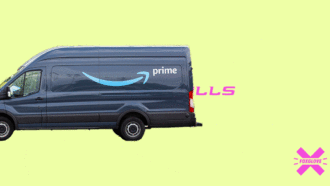We need to talk about the cost of fast delivery
By Cori Crider
She must have felt like a goldfish in a bowl. There she was, just trying to get on with her job, stowing and scanning an endless stream of stuff while I and about a dozen other suited professionals circled her.
We weren’t allowed talk to her or photograph her workstation (‘for her safety’, bosses claimed). Instead, we listened into headsets while the factory manager reeled off statistics about what this woman’s job – the day-to-day of an Amazon warehouse worker – was like.
You could see she was tired. A robotic cart over twice her height trundled in front of her. She picked up an item – a book, a protein shake, a toy, any of thousands of little bits you and I buy on Amazon every day – and she loaded it onto a slot in the cart, scanned it with a gun, checked a screen, and did it again. And again and again. When she’d filled a cart, it’d wheel away, and another moved into place. She does this all day – for ten hours, with two 30-minute breaks.
So what was I doing there, gawking at this woman? Foxglove is launching a new project, building on our work supporting Facebook moderators and other tech workers, to tackle Amazon. We’re teaming up with unions and allies to investigate conditions and to boost Amazon workers’ fight to make these jobs decent and fair.
I wanted to go to the heart of ‘fast delivery’—to see one of these massive warehouses for myself. The Tilbury site, where I was, is one of the largest and most roboticised in Europe. It has a massive demand to meet: nearly 90% of UK shoppers use Amazon for everything from toasters to nappies. During the pandemic its promise of insta-delivery ballooned in importance and made Jeff Bezos, for a time, the world’s richest man.
But one-click convenience comes at a cost – you may have heard of workers peeing in bottles, and maybe of Prime Day strikes. Fast delivery burns through people. I asked the Tilbury bosses for the warehouse’s annual turnover figures; comparable warehouses in the US churn through people at a whopping 150 percent clip each year. Though my tour guides knew they had exactly 36 apprentices, the turnover rates escaped their memory.
We moved on to another tired woman, a ‘picker,’ toiling in a great hurry in a sort of pen. She had just seconds to handle each item correctly to meet her performance targets. This precipitated a moment of striking candour from the floor manager, who described these time pressures and added a remark that stayed with me:
“This is what same-day delivery takes. This is what the customer requires.”
When I asked about Time off Task – the productivity metric that squeezes workers so hard that many have to urinate in bottles just to meet their targets – managers claimed it was for “worker safety.” This seems odd when you consider that hundreds of ambulances are called to Amazon warehouses – especially during peak times like Black Friday and Prime Day.
This – the hidden cost of one-click delivery – is the conversation we need to have. Standing in front of those women makes you think differently about the word ‘fast’. Many of us don’t reach for that Big Mac or £3 Primark T-shirt so often, because we’ve read how fast food and fast fashion are bad for us, bad for workers, and bad for the planet.
So what are we doing on Amazon Prime?
Like many tech giants, Amazon has won its dominance by refusing to pay for the misery it causes. It’s not just that Amazon pays almost no tax – they also don’t pay workers enough for a physically taxing, burn-out job working in a panopticon.
It’s an effective trick: Amazon, Facebook, Uber, Deliveroo, and the like all hide a degrading reality for workers behind a shiny screen interface. We kick back, put our feet up, and fondly imagine some computer whiz kids have sent us our Uber, or our pizza, or our stuff. Perhaps no tech giant has perfected this erasure better than Amazon.
Before we left the floor, I glanced left and right; I couldn’t see the end of the warehouse in either direction. Just long rows of people in front of robots, stowing and picking, a lucky few with a bird’s eye view of the shelves.
All I could think was: is fast really worth it?
Foxglove have launched a project to tackle unfair treatment at Amazon. If you work at Amazon, please get in touch. You can reach us securely over Signal: +44 7518 115 223. Hit button below to to stay up to date on this project.

